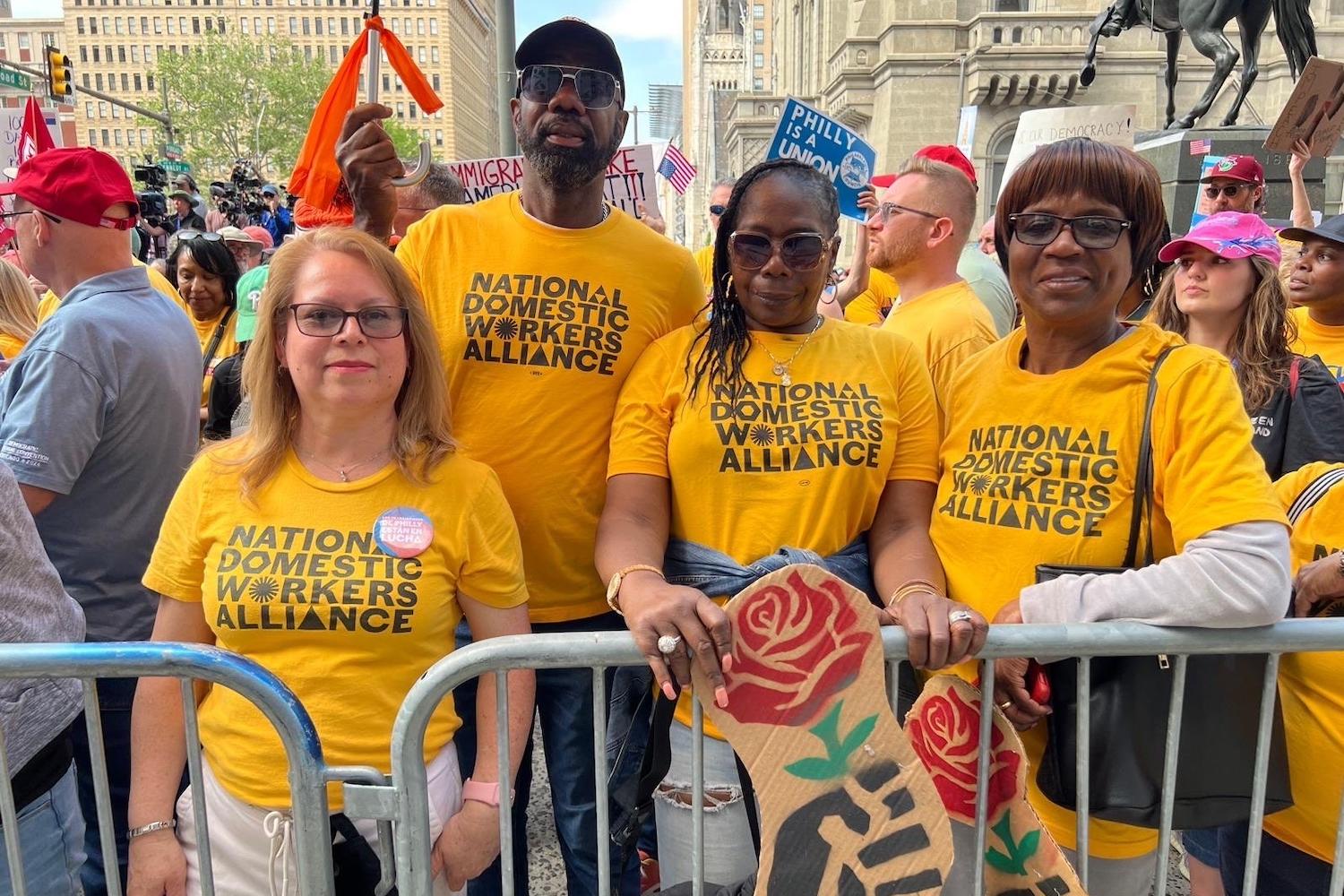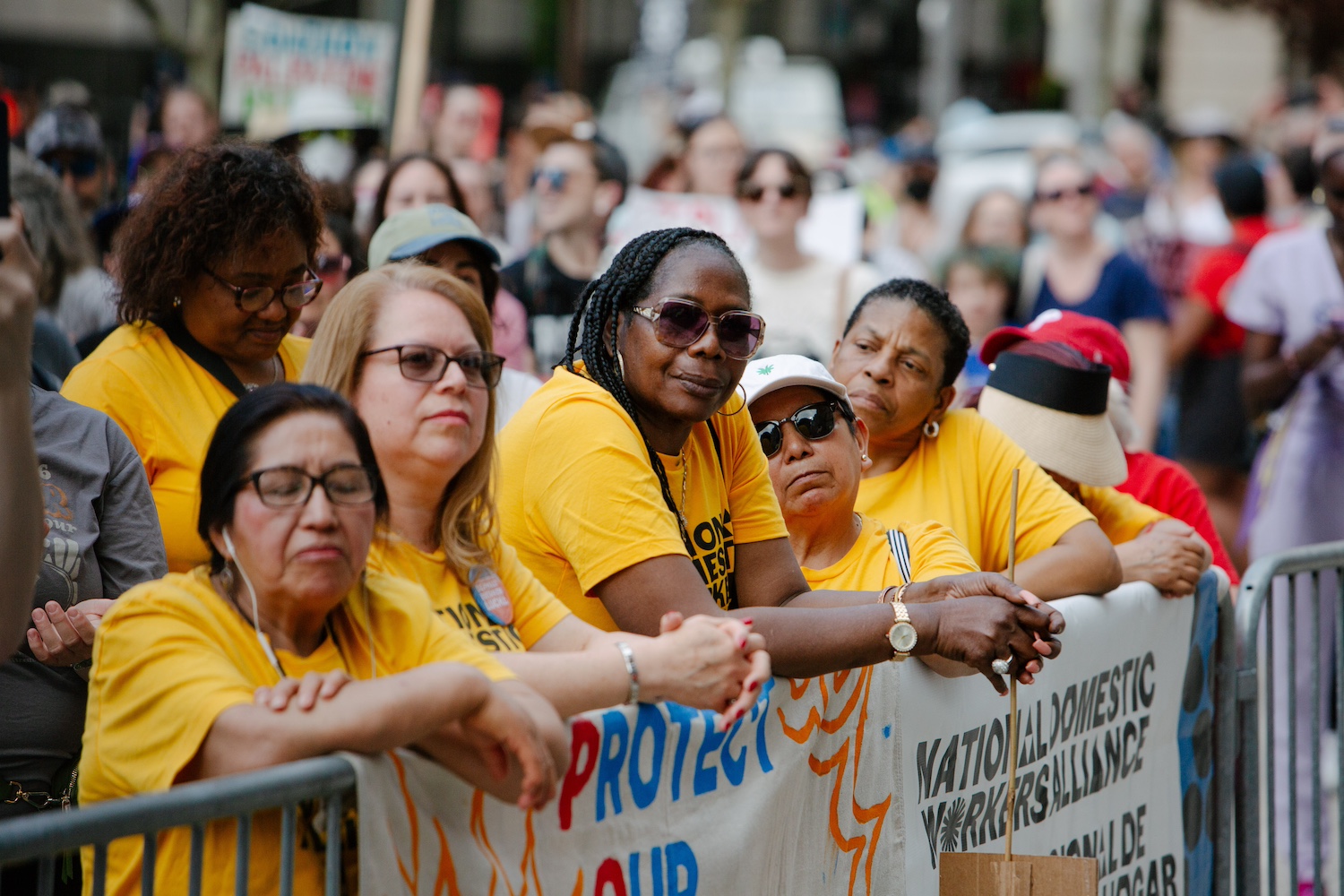
National Domestic Workers Alliance members, including Sandra Bryant (second from right), advocating for the POWER Act in Philadelphia. (Image courtesy of National Domestic Workers Alliance.)
Sandra Bryant loves her job. As a domestic healthcare provider in Philadelphia, she provides essential medical care in people’s homes. But when she needed her own medical treatment, her employers wouldn’t provide the necessary paid leave.
“They said, ‘Okay. Go to the doctor, and as soon as you get better, you can come back,” Bryant recalled. “That's it.”
Now, a local labor law aims to help workers like Bryant enforce their rights to breaks, fair pay, paid leave and more. Passed on May 8, the Philadelphia POWER Act (Protect Our Workers — Enforce Rights) strengthens protections for non-unionized and non-traditional employees, like those in domestic, restaurant and gig industries. Through the POWER Act, Philadelphia is building a robust support system for 750,000 people who don’t have traditional paths to worker rights.
Federal labor laws to protect non-traditional workers don’t exist. It’s up to local labor laws to fill the gaps. “We want to demonstrate, and I think have successfully demonstrated, that there is still ability to win change at the local level that could impact millions of people,” said Nicole Kligerman, Philadelphia chapter director of the National Domestic Workers Alliance. The alliance was part of the coalition behind the POWER Act.
This isn’t Philadelphia’s first local labor law, or even its first law for non-traditional employees. In 2019, the Philadelphia Domestic Workers Bill of Rights also offered protections, but it lacked tools for enforcement. “The law, it was already there,” said Bryant, who is an alliance member. “The employers dance around it and act like it wasn't there.”
The POWER Act provides essential tools that can help make Philly’s worker protection system actually work. “A law on paper is not worth the paper it's printed on unless there is actually a system to make it real,” Kligerman said.
Protecting the most vulnerable workers
Employees in non-unionized or non-traditional jobs often lack formalities, like employment contracts, to support their rights. Historically, many employers took advantage of this lack of structure. They could get away with making unreasonable demands and punishing workers who claimed legal rights like breaks and paid sick leave. When workers stood up for themselves, they’d often face retaliation: stolen wages, cut hours, even getting fired. “We as workers in Philadelphia have a lot of bad employers over here,” Bryant said.
The POWER Act could soon change this status quo. Now, employers must pay damages for labor violations — not just to the city, but to workers. This means employees can get the wages they’re owed, plus additional payments that help meet the full costs of lost wages, which can include missed car payments, fines, and even evictions for unpaid rent.
When it comes to retaliation, the POWER Act shifts the burden of demonstrating proof from workers to employers. If a worker feels they’ve been unfairly retaliated against, they no longer have to prove it happened. Instead, the employer has to prove it didn’t happen or face consequences.
The Office of Worker Protections can now proactively investigate employers and take lawbreaking employers to court. Repeat offenders will be added to a public Bad Actors Database. If they don’t change, they can have their business licenses revoked.

Moving the POWER Act forward
The POWER Act may have smoothed the path toward worker rights in Philadelphia, but there are still bumps in the road ahead. Successfully implementing it depends on funding. Supporters requested $3.5 million for the Department of Labor to do so, including the short-staffed Office of Worker Protections.
“We hope, and are going to continue fighting and pushing the city, to make sure that this is an actionable law and not just something that's written down,” said Brittany Alston, founder and executive director of the Philly Black Worker Project, another organization in the POWER Act coalition.
Implementation also depends on holding elected officials accountable. “Are they going to make sure that [Bad Actors] Database is up and running, and also up to date?” Alston added.
Workers also have to know about the act, and feel supported enough to use it, for it be effective. Organizers are offering training sessions to provide workers with essential information and encourage them to spread the word. “We as workers who know about it now should, just as soon as we meet our friends and family, we should pass the law onto them,” Bryant said. “And just let them know that a law is there to protect them in case anything happens.”
But it shouldn't only fall on workers and organizers to make sure people know their rights, said Kligerman of the National Domestic Workers Alliance. “We have to make sure it's the government's job to educate workers and employers about their rights and their responsibilities,” she said.
Pathways to protections across the nation
Passing the new law was a feat of cooperation. “One of the amazing things about the POWER Act is that it brought together a coalition of different worker centers, formal labor unions, and community organizations to fight for non-unionized employees in the city of Philadelphia,” Alston said. “The outcome is really important, but also the process of working together in this very intersectional way is important, too.”
That’s perhaps the biggest lesson for other communities hoping to replicate the law: It takes a wide range of people coming together to enact change. Alston suggests considering this question: “Who are all of the players that need to be at the table to place as much power as possible in your coalition?”
The act’s power comes from bringing together not just local labor groups and organizations, but also workers. “We have Black and Brown workers at the table,” Alston said. “We have immigrant workers at the table. We have women and femme workers at the table, who are all guiding this legislation.”

Elyse Hauser is a freelance writer from the Pacific Northwest whose work focuses on environmental issues and solutions. As a lover of all things aquatic, she often writes about water and its ecosystems, from rivers to the deep sea. She has an MFA from the University of New Orleans, and has also learned from the Center for Investigative Journalism (SUJO) in Bergen, Norway.














